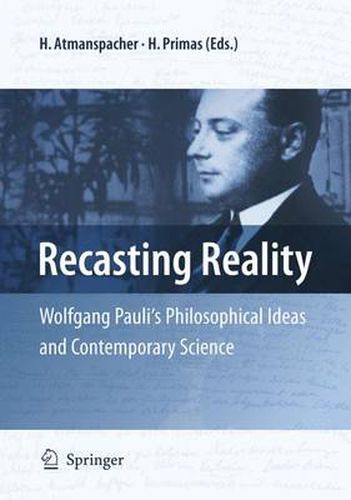Readings Newsletter
Become a Readings Member to make your shopping experience even easier.
Sign in or sign up for free!
You’re not far away from qualifying for FREE standard shipping within Australia
You’ve qualified for FREE standard shipping within Australia
The cart is loading…






This title is printed to order. This book may have been self-published. If so, we cannot guarantee the quality of the content. In the main most books will have gone through the editing process however some may not. We therefore suggest that you be aware of this before ordering this book. If in doubt check either the author or publisher’s details as we are unable to accept any returns unless they are faulty. Please contact us if you have any questions.
1 2 Harald Atmanspacher and Hans Primas 1 Institute for Frontier Areas of Psychology, Freiburg, Germany,[email protected] 2 ETH Zurich, Switzerland,[email protected] Thenotionofrealityisofsupremesigni?canceforourunderstandingofnature, the world around us, and ourselves. As the history of philosophy shows, it has been under permanent discussion at all times. Traditional discourse about - ality covers the full range from basic metaphysical foundations to operational approaches concerning human kinds of gathering and utilizing knowledge, broadly speaking epistemic approaches. However, no period in time has ex- rienced a number of moves changing and, particularly, restraining traditional concepts of reality that is comparable to the 20th century. Early in the 20th century, quite an in?uential move of such a kind was due to the so-called Copenhagen interpretation of quantum mechanics, laid out essentially by Bohr, Heisenberg, and Pauli in the mid 1920s. Bohr’s dictum, quoted by Petersen (1963, p.12), was that it is wrong to think that the task of physics is to ?nd out how nature is. Physics concerns what we can say about nature. Although this standpoint was not left unopposed - Einstein, Schr odinger, and others were convinced that it is the task of science to ?nd out about nature itself - epistemic, operational attitudes have set the fashion for many discussions in the philosophy of physics (and of science in general) until today.
$9.00 standard shipping within Australia
FREE standard shipping within Australia for orders over $100.00
Express & International shipping calculated at checkout
This title is printed to order. This book may have been self-published. If so, we cannot guarantee the quality of the content. In the main most books will have gone through the editing process however some may not. We therefore suggest that you be aware of this before ordering this book. If in doubt check either the author or publisher’s details as we are unable to accept any returns unless they are faulty. Please contact us if you have any questions.
1 2 Harald Atmanspacher and Hans Primas 1 Institute for Frontier Areas of Psychology, Freiburg, Germany,[email protected] 2 ETH Zurich, Switzerland,[email protected] Thenotionofrealityisofsupremesigni?canceforourunderstandingofnature, the world around us, and ourselves. As the history of philosophy shows, it has been under permanent discussion at all times. Traditional discourse about - ality covers the full range from basic metaphysical foundations to operational approaches concerning human kinds of gathering and utilizing knowledge, broadly speaking epistemic approaches. However, no period in time has ex- rienced a number of moves changing and, particularly, restraining traditional concepts of reality that is comparable to the 20th century. Early in the 20th century, quite an in?uential move of such a kind was due to the so-called Copenhagen interpretation of quantum mechanics, laid out essentially by Bohr, Heisenberg, and Pauli in the mid 1920s. Bohr’s dictum, quoted by Petersen (1963, p.12), was that it is wrong to think that the task of physics is to ?nd out how nature is. Physics concerns what we can say about nature. Although this standpoint was not left unopposed - Einstein, Schr odinger, and others were convinced that it is the task of science to ?nd out about nature itself - epistemic, operational attitudes have set the fashion for many discussions in the philosophy of physics (and of science in general) until today.